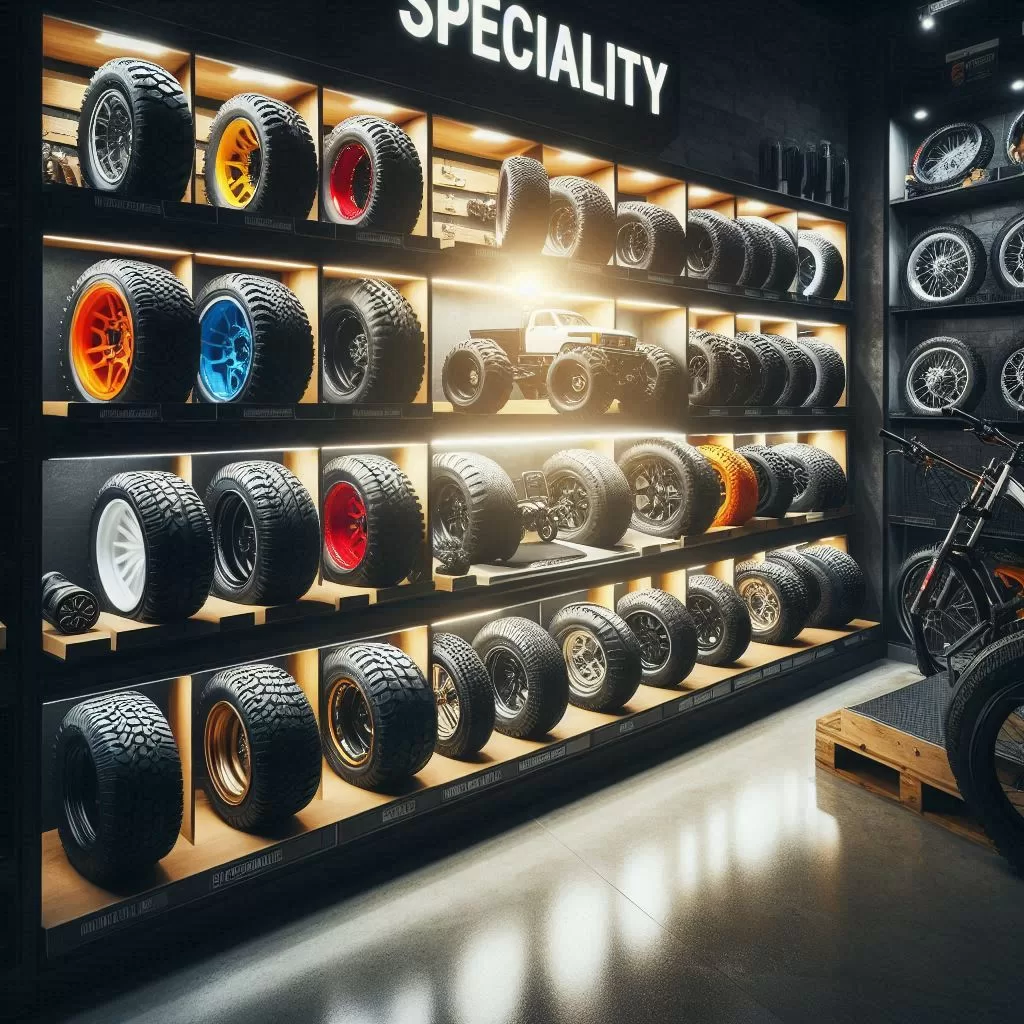
Table of Contents
Introduction: Specialty tires might not be the first thing that comes to mind when considering how to optimize your business, but they play a critical role in efficiency and productivity across various industries. Choosing the right specialty tires for your equipment can significantly impact your business operations, reduce costs, and improve performance. In this article, we’ll delve into the world of specialty tires, exploring their types, uses, and how to choose the best ones for your specific needs.
Understanding Specialty Tires
What Are Specialty Tires?
Specialty tires are designed for specific vehicles and purposes, often used in industries like agriculture, construction, and manufacturing. Unlike standard tires, specialty tires are built to handle unique conditions, such as rough terrains, heavy loads, and varying weather patterns. These tires are engineered with specialized materials and tread patterns to meet specific requirements, making them indispensable for businesses relying on heavy-duty machinery and specialized equipment.
Importance in Various Industries
Specialty tires are vital across a range of industries. In agriculture, they help tractors and combines navigate through muddy fields without getting stuck. Construction companies rely on them to provide stability and safety for heavy machinery on uneven terrain. In industrial settings, they ensure that forklifts and other equipment can move smoothly across different surfaces. The right tires can enhance efficiency, reduce wear and tear on equipment, and ultimately contribute to a business’s bottom line.
Types of Specialty Tires
Agricultural Tires
Tractor Tires
Tractor tires are the workhorses of the agricultural world. Designed for traction and durability, these tires are built to handle the rigors of farm work, from plowing fields to hauling loads. They come in different sizes and tread patterns to suit various soil types and tasks. Whether it’s pulling a plow through wet soil or carrying heavy bales of hay, choosing the right tractor tire is essential for efficient farming operations.
Implement Tires
Implement tires are used on equipment like plows, sprayers, and harvesters. These tires are designed for durability and stability, ensuring that the equipment can perform its functions effectively without causing soil compaction. The choice of implement tires can affect the ease of use and efficiency of farm machinery.
Construction Tires
Off-the-Road Tires
Off-the-road (OTR) tires are built to handle the toughest conditions on construction sites. They provide excellent traction and stability on rocky, uneven terrain. These tires are commonly used on dump trucks, loaders, and backhoes, where durability and resistance to punctures are crucial. With the right OTR tires, construction equipment can operate efficiently, minimizing downtime and enhancing productivity.
Grader Tires
Grader tires are essential for maintaining smooth and even surfaces on roads and construction sites. They provide the traction needed for graders to level surfaces effectively. The right grader tire can ensure that operations run smoothly and that surfaces are finished to a high standard.
Industrial Tires
Forklift Tires
Forklift tires come in several types, including pneumatic, solid, and cushion. Each type has its own set of advantages depending on the environment. Pneumatic tires are ideal for outdoor use on rough surfaces, while solid tires offer durability and puncture resistance in indoor settings. Choosing the right forklift tire can impact the efficiency and safety of warehouse operations.
Skid Steer Tires
Skid steer tires are designed for versatility and durability. They need to withstand the constant turning and maneuvering that skid steers are known for. Whether used in construction, landscaping, or agriculture, the right skid steer tire can enhance performance and extend the life of the equipment.
Recreational Tires
ATV Tires
ATV tires are designed for off-road adventures. They come in a variety of tread patterns and sizes to tackle different terrains, from muddy trails to sandy dunes. Choosing the right ATV tire is crucial for safety and performance, ensuring that the vehicle can handle the demands of outdoor excursions.
Golf Cart Tires
Golf cart tires may seem simple, but they play a vital role in providing a smooth ride on the golf course. These tires are designed to minimize turf damage while offering traction on grass and pavement. Selecting the right golf cart tire can enhance the overall experience for golfers and maintenance staff alike.

Factors to Consider When Choosing Specialty Tires
Load Capacity
One of the most critical factors in selecting specialty tires is load capacity. It’s essential to choose tires that can handle the weight of the equipment and the loads it carries. Overloading tires can lead to premature wear, blowouts, and equipment damage.
Terrain and Environment
The environment in which the equipment operates plays a significant role in determining the right tire. For example, construction sites with sharp rocks require more robust, puncture-resistant tires, while farms with wet, muddy fields need tires with deep treads for traction. Understanding the operating environment helps in selecting tires that provide the best performance and longevity.
Tire Composition and Design
The materials and design of a tire can greatly affect its performance. Some tires are made with reinforced sidewalls for added durability, while others have unique tread patterns for better grip. Considering the tire’s composition and design features ensures that it meets the specific demands of your business.
Specialty Tires and Business Performance
The right specialty tires can have a direct impact on business performance. By improving equipment efficiency, reducing downtime, and minimizing maintenance costs, businesses can achieve better productivity and profitability. Investing in high-quality specialty tires is an investment in the success of your business.
Common Myths About Specialty Tires
There are several myths surrounding specialty tires that can lead to misconceptions. One common myth is that all tires are the same, which overlooks the critical differences in design and application. Another is that premium tires are always the best choice, but the right tire depends on specific needs and conditions. Understanding these myths can help businesses make more informed decisions.
Conclusion
Specialty tires are a crucial component in many industries, offering unique benefits that enhance performance and efficiency. By understanding the different types of specialty tires and considering key factors like load capacity and terrain, businesses can make informed choices that positively impact their operations. Remember, the right tire isn’t just a purchase; it’s a strategic decision that can drive success and growth.
FAQs
1: What are the main types of specialty tires?
Specialty tires include agricultural, construction, industrial, and recreational types, each designed for specific applications and conditions.
2: How do I choose the right specialty tire for my business?
Consider factors like load capacity, terrain, and tire composition. Assess the specific needs and conditions of your operations to select the best tire.
3: Are specialty tires more expensive than regular tires?
Specialty tires can be more expensive due to their specialized design and materials, but they offer greater performance and longevity, which can offset the initial cost.
4: Can I use specialty tires for regular vehicles?
While some specialty tires may fit regular vehicles, they are designed for specific applications and conditions. Using them on regular vehicles may not provide the best performance or safety.
5: How often should I replace specialty tires?
Replacement frequency depends on usage, environment, and tire maintenance. Regular inspections and proper care can extend the life of specialty tires, but they should be replaced when tread wear or damage is significant.



1 Comment
David
Very instructing article